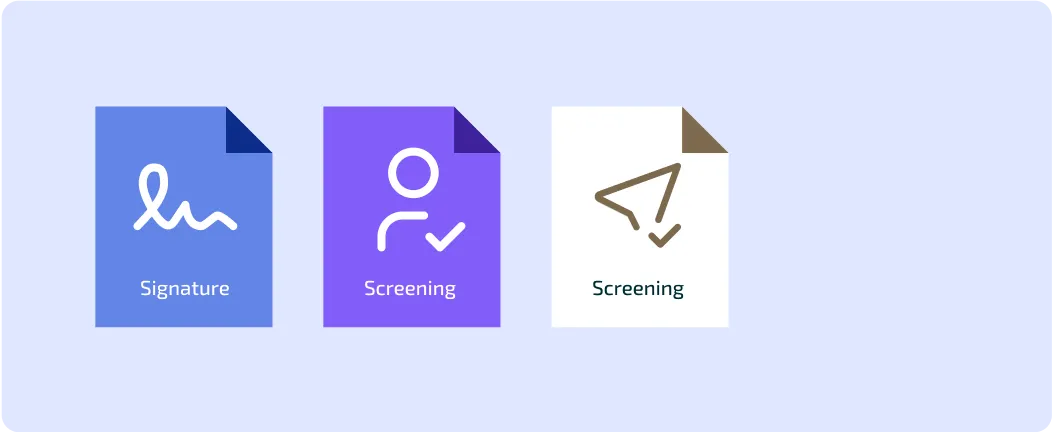.webp)
Published on
June 24, 2025
Economic Sanctions in AML: Screening and Compliance

Accelerate AML Compliance: Meet Regulatory Demands with 80% Less Setup Time
.svg)
.svg)
Economic sanctions are financial and commercial penalties applied by one or more countries against a targeted country, group, individual, or entity. These measures are usually implemented to achieve foreign policy and national security goals, often aimed at curbing illegal activities like human rights abuses, or the proliferation of weapons of mass destruction. In the context of Anti-Money Laundering (AML) compliance, financial institutions must screen customers and transactions against sanctions lists (such as the U.S. Office of Foreign Assets Control (OFAC) List, the EU Consolidated List, or the United Nations Security Council Sanctions List) to prevent processing prohibited transactions. Non-compliance can result in severe regulatory penalties.
Sanctions can be comprehensive, banning all transactions, or targeted, focusing on individuals, businesses, or sectors (like energy or defense). Institutions must maintain real-time monitoring systems to detect sanctioned entities. Key international frameworks that regulate sanctions include the Financial Action Task Force (FATF) recommendations and country-specific regulations like the U.S. OFAC Sanctions Programs.
Failure to comply can expose banks and corporations to massive fines, legal action, and reputational damage.
Example:
Standard Chartered Bank (SCB), a major global bank based in London, admitted to violating U.S. sanctions on Iran by processing around 9,500 illegal financial transactions worth about $240 million through the U.S. financial system between 2007 and 2011. This was a clear breach of the International Emergency Economic Powers Act (IEEPA), which governs U.S. economic sanctions.
SCB's misconduct involved:
- Willfully helping Iranian clients disguise their identities and move U.S. dollars via front companies in the UAE.
- Serious compliance failures: SCB’s systems allowed transactions involving sanctioned countries without proper checks.
- Repeated violations: SCB had already faced a penalty in 2012 for similar behavior, but the illegal activity continued.
Read more: Sanction Screening in the UAE: What to Do if a Customer is Listed
Consequences:
- SCB agreed to pay over $1 billion in combined penalties to U.S. and UK authorities.
- Its Deferred Prosecution Agreement (DPA) with the U.S. Department of Justice was extended for two more years.
- SCB admitted criminal wrongdoing and committed to enhanced compliance and reporting.
Key Point:
This case highlights how serious U.S. authorities are about enforcing sanctions, especially against financial institutions that knowingly assist sanctioned countries. Financial compliance programs must be strong enough to prevent and detect these violations.
Streamline Compliance: Achieve 80% Faster Setup for Fraud Prevention
.svg)
.svg)

How Aseel reduced onboarding time by more than 87% using FOCAL
Learn how FOCAL empowered Aseel to achieve new milestones.


Mastering Fraud Prevention: A Comprehensive Guide for KSA and MENA Businesses
51% of organizations fell victim to fraud in the last two years, don't be caught off guard, act proactively.


Featured blog posts


Economic Sanctions in AML: Screening and Compliance
Learn why economic sanctions are critical to AML efforts and how financial firms must screen customers, with lessons from a high-profile violation case.
.webp)

Economic Sanctions in AML: Screening and Compliance
Learn why economic sanctions are critical to AML efforts and how financial firms must screen customers, with lessons from a high-profile violation case.
.webp)

Economic Sanctions in AML: Screening and Compliance
Learn why economic sanctions are critical to AML efforts and how financial firms must screen customers, with lessons from a high-profile violation case.
.webp)





AI-Driven Precision in Fraud Risk and AML Compliance



.svg)
.png)





.svg)

_FastestImplementation_Small-Business_GoLiveTime.png)

_HighPerformer_Small-Business_HighPerformer.png)
_Leader_Leader.png)



%20(1).webp)